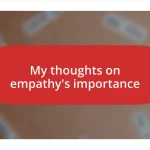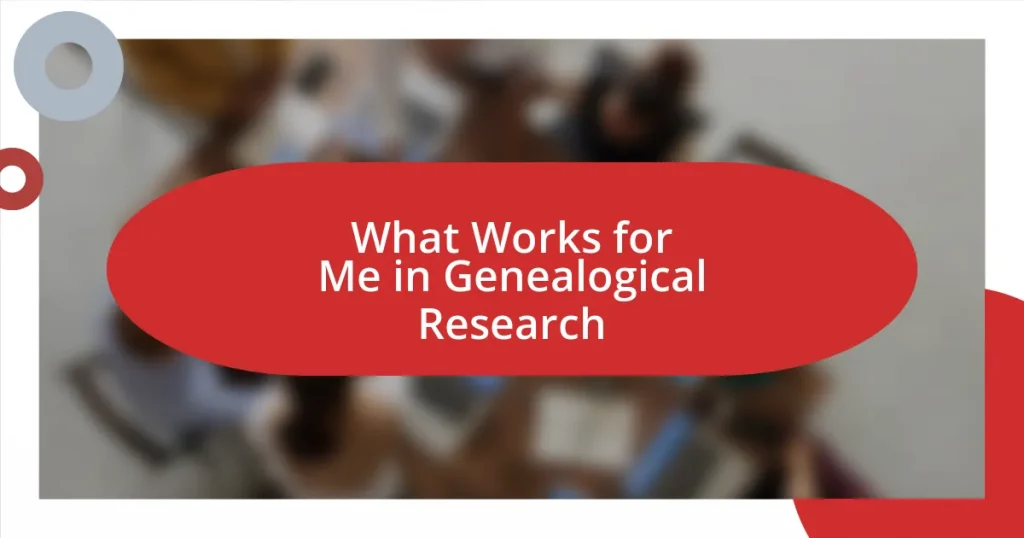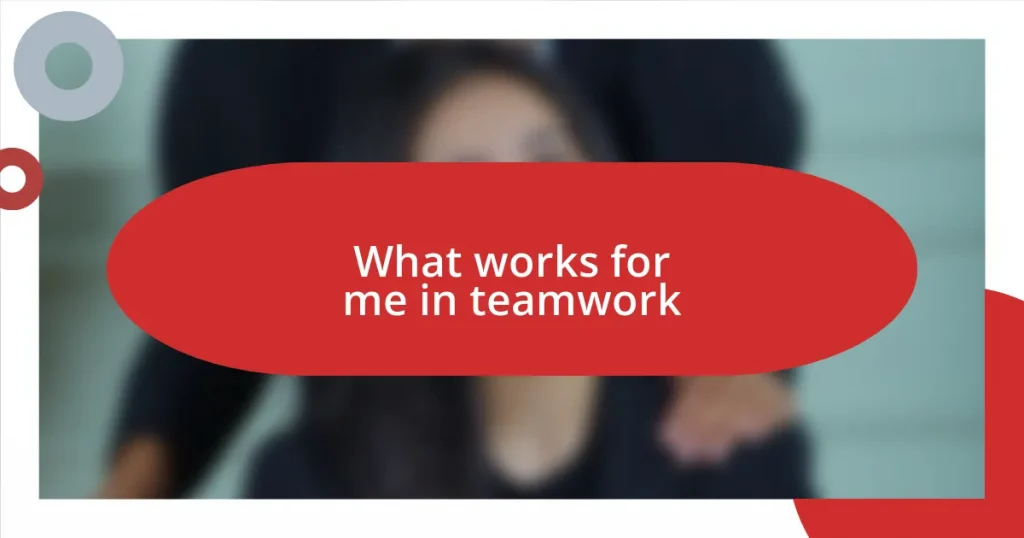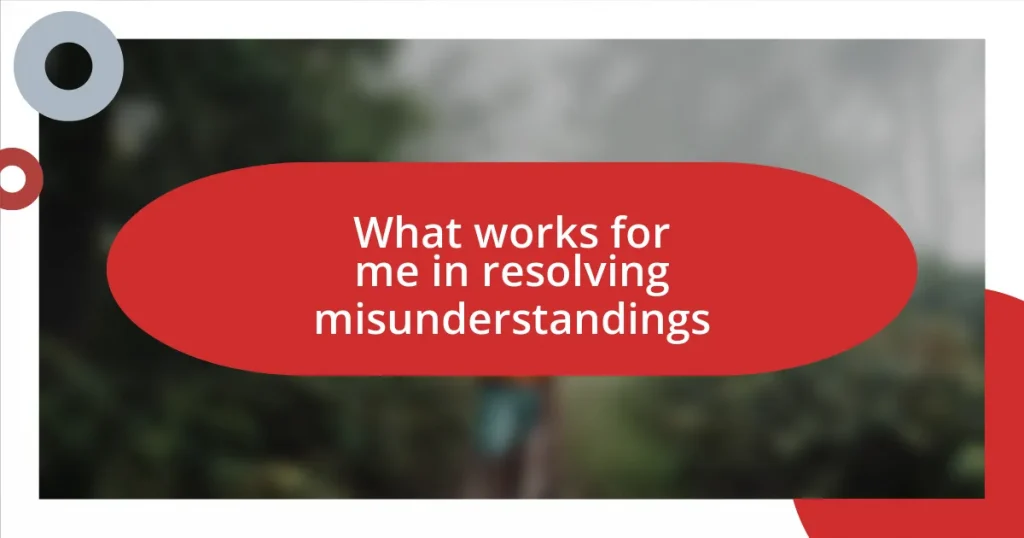Key takeaways:
- Understanding the context of ancestors, including local histories and social conditions, is crucial for effective genealogical research.
- Utilizing a mix of online genealogical databases, software, and collaborating with other researchers enriches the research experience.
- Organizing research data with clear documentation and citation practices enhances clarity and efficiency in tracking findings.
- Engaging with archives and libraries provides access to unique records and opportunities for surprising discoveries in family history.
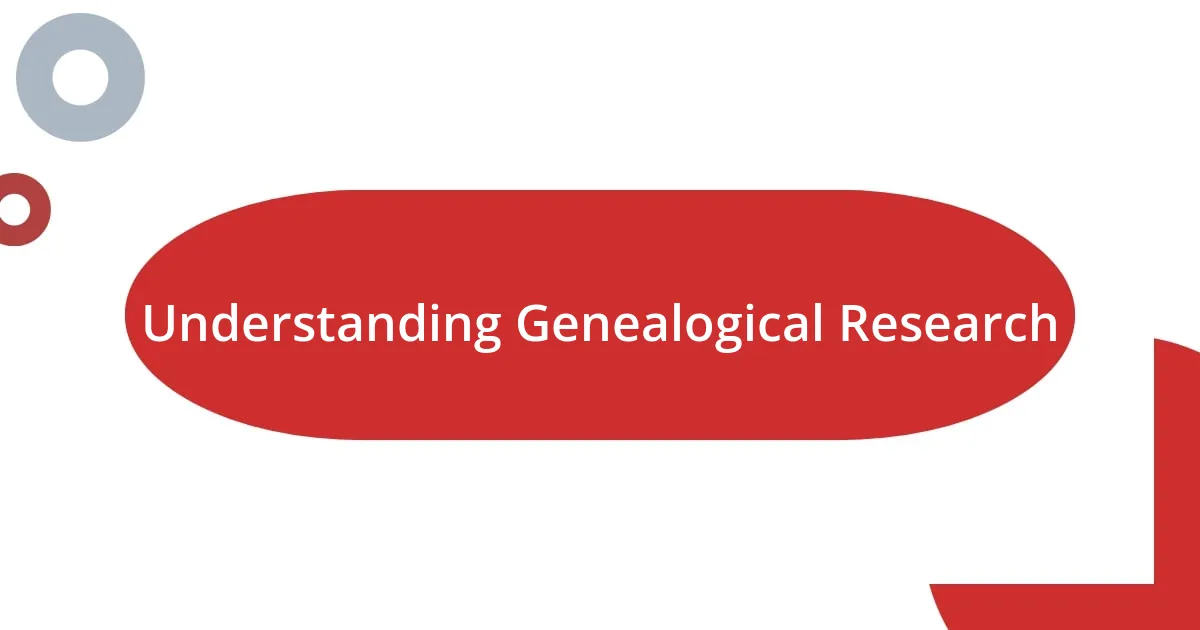
Understanding Genealogical Research
Genealogical research can feel like piecing together a timeless puzzle, where each family connection adds to a broader story. I remember the thrill of uncovering an elusive ancestor, a distant cousin who had lived through a major historical event. How often do we stop to think about the lives that shaped our own through the threads of history?
When diving into research, it’s vital to understand the context surrounding your ancestors. Local histories, social conditions, and even migratory patterns can deeply influence family narratives. I often find myself pondering how different my life might be if my great-great-grandparents hadn’t made their bold choice to emigrate.
Using a combination of online resources and traditional records, like census data or vital records, opens up so many possibilities. I tend to sprinkle my research with visits to local archives or libraries, which feels like walking through time; it’s a chance to hold history in my hands. Have you ever felt that connection when holding a document that once belonged to your family? Each discovery often leads to a flood of emotions, reminding me just how connected we are to those who came before us.
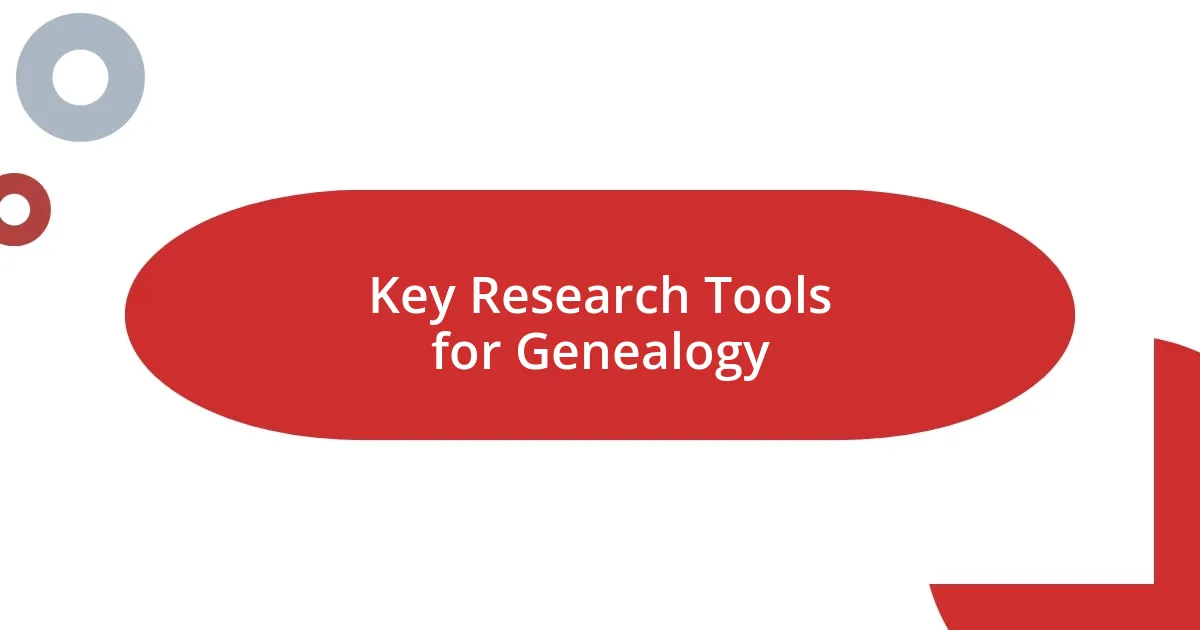
Key Research Tools for Genealogy
Researching family history can be both exhilarating and overwhelming, especially given the myriad of tools available today. One method I find invaluable is leveraging genealogical databases like Ancestry or MyHeritage. The access to vast records and user-generated family trees is a game changer; it’s incredible how a simple search can lead me down an unexpected path toward a long-lost relative. I recall the moment I discovered an entire branch of my family tree I had no idea existed—it was like unearthing a treasure.
In my experience, I’ve also come to appreciate the power of collaborative tools. For example, using dedicated software like Family Tree Maker or online platforms like FamilySearch lets me organize my findings and collaborate with family members. I remember the joy I felt when I invited relatives to add stories and documents; it turned our shared past into a vibrant tapestry rather than just a collection of names and dates. Have you ever thought about how inviting others to contribute could enrich your research experience?
Lastly, don’t underestimate the value of social media groups and forums dedicated to genealogy. Platforms like Facebook have thriving communities where enthusiasts share tips, advice, and even emotional support during tough research moments. I’ve made great connections through these groups, which often lead to breakthroughs in my searches. The camaraderie and shared passion for family history can truly amplify the research journey, and let’s face it, we all need that sense of community.
| Research Tool | Benefits |
|---|---|
| Genealogy Databases (e.g., Ancestry, MyHeritage) | Access to extensive records and user-generated family trees, fostering unexpected discoveries. |
| Genealogy Software (e.g., Family Tree Maker) | Helps organize findings and encourages collaboration with family members. |
| Social Media Groups | Provides community support and shared knowledge, enhancing the research experience. |
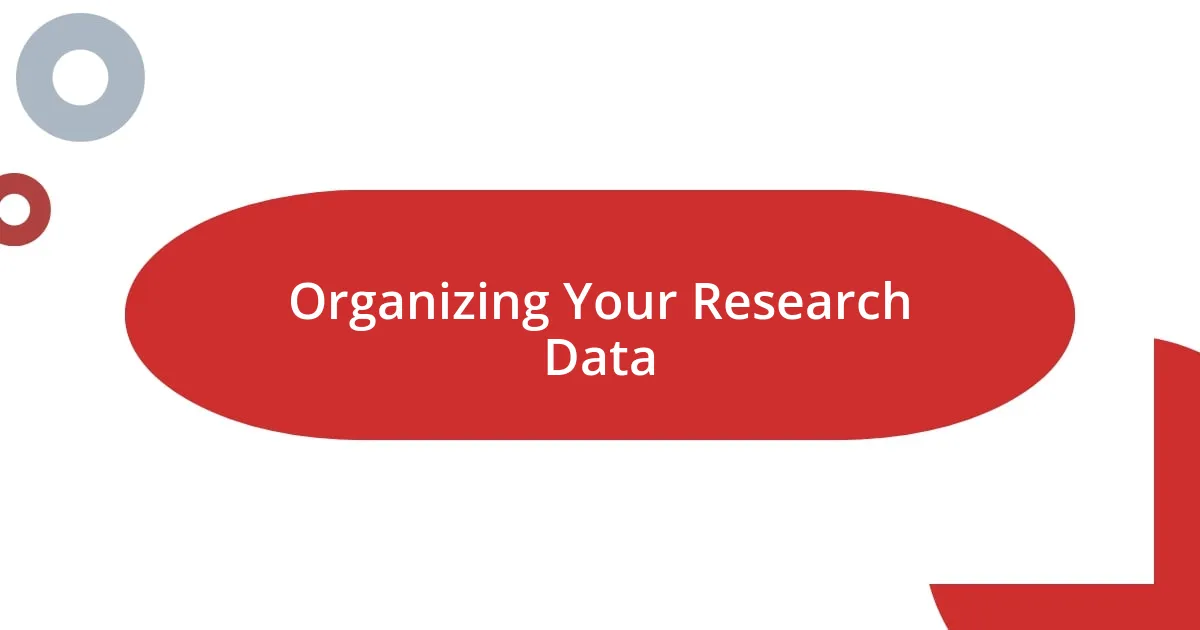
Organizing Your Research Data
Organizing your research data is essential for making sense of the information you gather. Personally, I’ve found that creating a system that suits my style can vastly improve my efficiency and clarity. For instance, I keep digital and physical folders for each branch of my family tree. There’s something comforting about flipping through tangible papers, but the ability to keyword search digital files can’t be beat. I often feel a wave of relief knowing that my documents are easy to access, which allows me to focus on the rich stories they reveal.
Here’s a few strategies that really work for me:
-
Label and Date Documents: When I scan or save records, I always include the date and a brief description in the file name. This makes retrieval much faster.
-
Use a Spreadsheet: I find creating a simple spreadsheet to track names, birthdates, and sources incredibly handy. It’s like having a mini database that I can sort through with ease.
-
Regular Backups: To safeguard against the unexpected, I backup my data on an external drive and a cloud service. Trust me, the peace of mind is worth it.
-
Visual Organizers: I often sketch out family trees or timelines, which helps me visually connect the dots and more deeply engage with my family’s history.
Creating an organizational system isn’t just about keeping data tidy; it’s about enhancing the entire research experience. I remember the frustration of combing through a chaotic stack of papers, and that taught me the importance of maintaining order. Embracing a more structured approach has allowed me to dive deeper into my research with confidence, knowing that everything is at my fingertips when I need it.
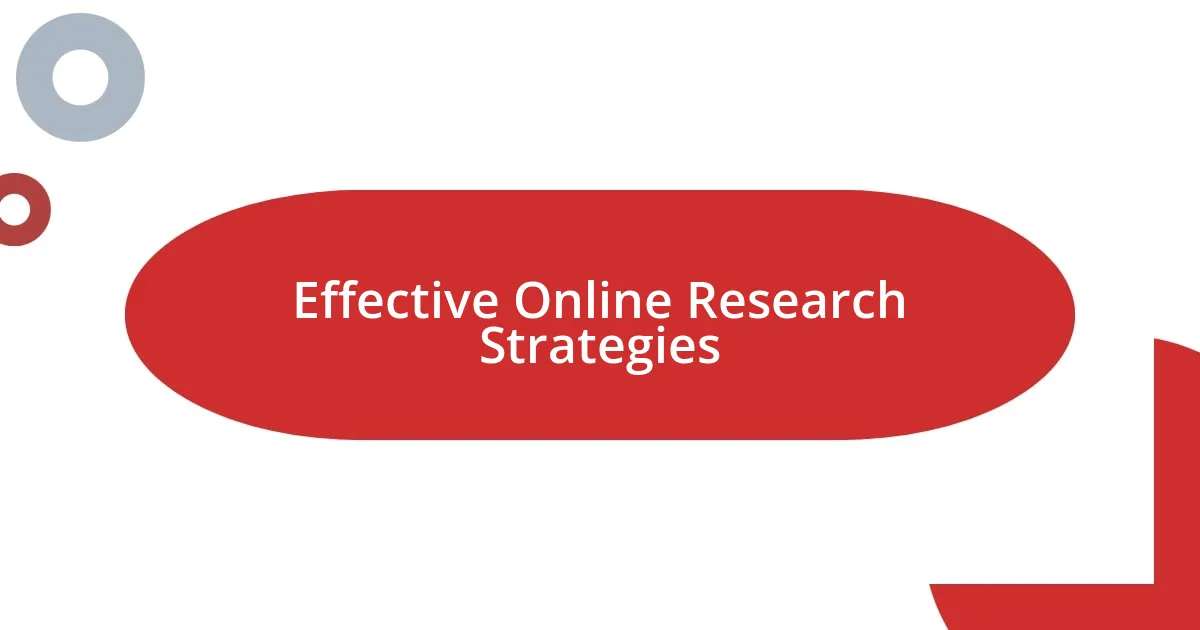
Effective Online Research Strategies
The internet is a treasure trove when it comes to genealogical research, and I’ve really honed my online strategies over time. One effective tactic I rely on is using advanced search filters in databases like Ancestry or FamilySearch. It’s amazing how a tiny tweak, like adjusting the date range or specifying a location, can drastically narrow down results and unveil documents I never would have found otherwise. Have you considered how minor adjustments in your search parameters could lead to significant discoveries?
Another gem I’ve stumbled upon is utilizing the citation tools these platforms offer. Whenever I find a relevant record, I make it a habit to save the citation to my research log. This not only keeps me organized but also helps me track the sources effortlessly later on. I remember once losing track of a vital resource because I didn’t bother to write it down. It’s a lesson I won’t forget; I now see citations as the backbone of my research.
Finally, I can’t stress enough the importance of engaging with online webinars and courses on genealogy. Joining sessions has opened up new avenues for me, exposing me to both advanced searching techniques and innovative methodologies I hadn’t considered. One time, a live Q&A led me to a research strategy that ultimately connected me to a distant cousin I hadn’t even known existed. Have you tapped into the wealth of knowledge that exists in these online learning opportunities? It’s worth considering!
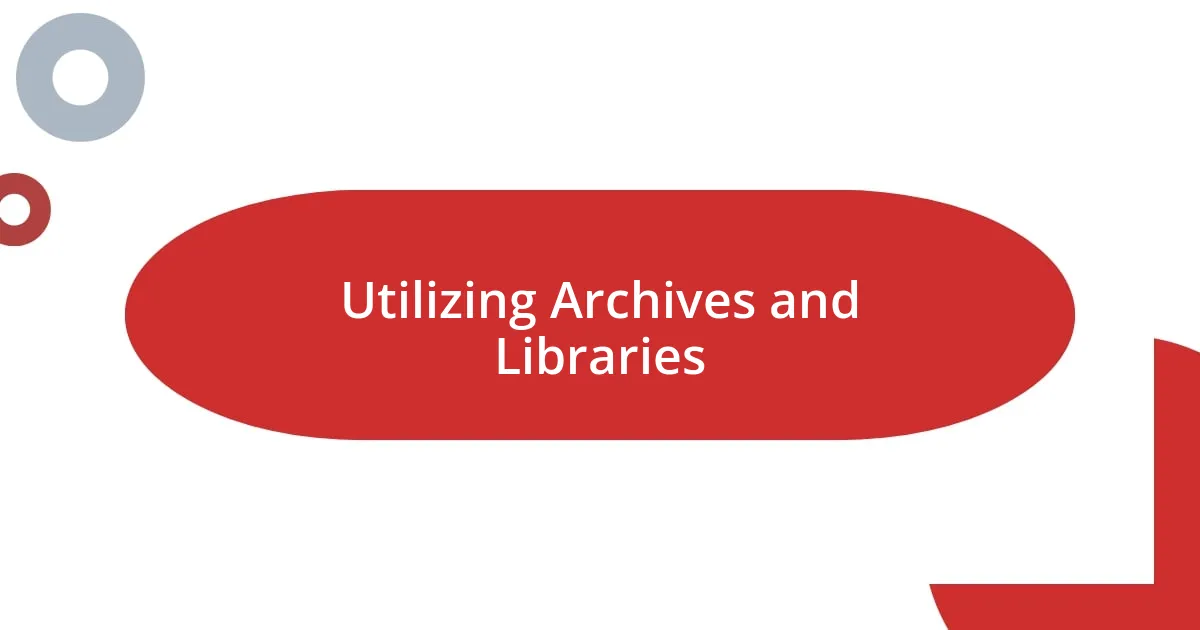
Utilizing Archives and Libraries
Utilizing archives and libraries has been a game-changer in my genealogical journey. I remember walking into my local library, the scent of old books enveloping me, and the excitement bubbling within. While many people think that everything is online, there’s a treasure trove of physical records waiting to be discovered in those quiet corners. Have you ever felt the thrill of unearthing a dusty old ledger that contains your ancestor’s name? It’s a feeling that just can’t be replicated through a screen.
When I dive into an archive, I focus on specific collections that align with my family’s history. For instance, I took a trip to a state archive that housed unique census records and military enlistments. The staff there were incredibly helpful, guiding me to materials I wouldn’t have thought to look for. Engaging with local archivists can open doors to resources and insights that might not be immediately apparent. Have you sought help from knowledgeable staff during your own visits? It can make all the difference in your experience.
Lastly, I’ve found that keeping an open mind can lead to surprising discoveries. During one visit to an archive, I stumbled upon a newspaper clipping that not only detailed my great-grandfather’s accomplishments but also included a photograph of him at a community event. Seeing his face for the first time gave me goosebumps—I felt a connection to my roots that I hadn’t sensed before. How might your family history come alive in similar unexpected ways? Engaging with archives and libraries can enrich your research, turning daunting tasks into moments of joy as you piece together your lineage.
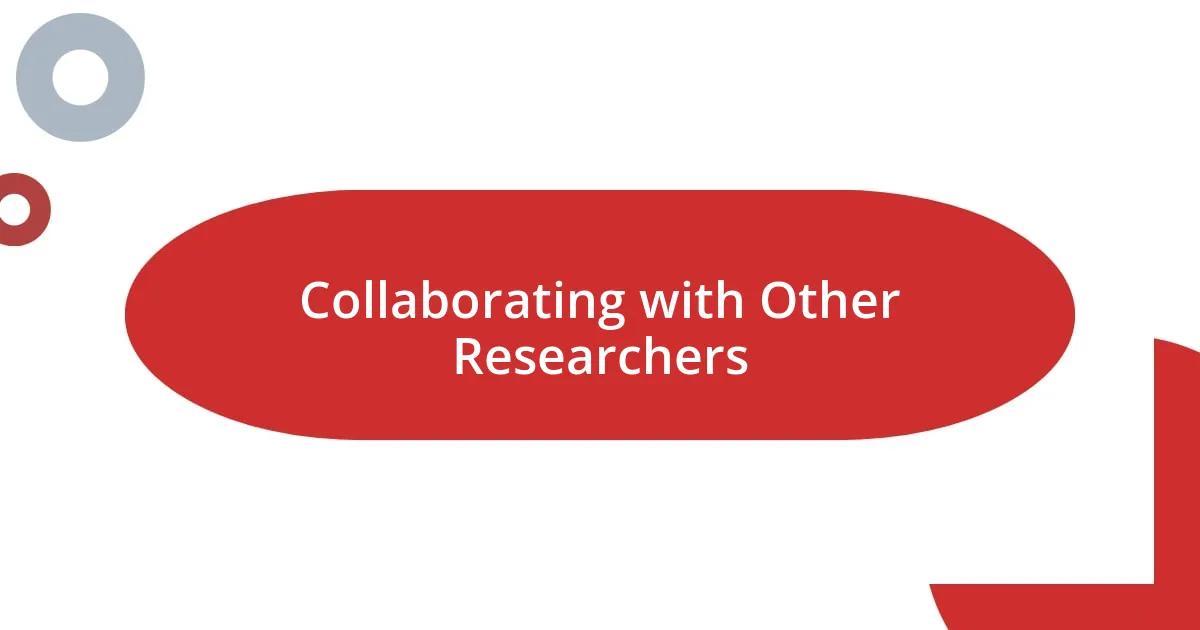
Collaborating with Other Researchers
When it comes to collaborating with other researchers, I have found it incredibly beneficial to engage with community forums and social media groups dedicated to genealogy. I recall a particularly enlightening exchange in an online forum where I shared my brick wall concerning my great-grandmother’s immigration. Someone chimed in with insights from their own research that led me to a new database I hadn’t considered. Have you ever felt the magic of connecting with someone who has just the piece of the puzzle you need?
Forming partnerships with fellow genealogists has also been a rewarding experience for me. I once teamed up with a distant cousin I found on a genealogy website. We compared notes, pooled resources, and even visited local cemeteries together, uncovering shared ancestors and stories. This collaborative process brought a fresh perspective to my research, making it not just about names and dates, but about family narratives. Have you thought about reaching out to fellow enthusiasts? Sharing knowledge can create not just enlightening moments, but friendships.
Moreover, I’ve learned the power of accountability when collaborating on projects. I joined a local genealogy club where members present their findings. Knowing I’d be sharing my progress keeps me motivated and focused. This communal approach fosters a supportive environment where we celebrate each other’s breakthroughs and offer constructive critiques. How might having a community surrounding your research goals change your perspective? Having others cheering you on makes the journey feel less solitary and more enriching.

Documenting Your Findings Properly
Documenting your findings properly has become a cornerstone of my genealogical research practice. After piecing together information from various sources, I take a moment to write down everything in a clear, organized manner, often creating digital folders and spreadsheets. Have you ever lost track of important details because they weren’t documented effectively? Trust me, I have—it’s a frustrating experience!
One approach that has worked wonders for me is adopting specific citation styles. For example, I often use the Evidence Explained method, which helps me detail where each piece of information comes from. After a lengthy search for obscure records, I found a marriage certificate that brought to light a whole branch of my family. Documenting it properly, complete with notes about how and where I found it, not only solidified my findings but also made it easier to revisit and share later. How might proper citation enhance your ability to trace your family history accurately?
Another tip is to create a research log where I jot down my thoughts and queries for each session. I remember one evening, sitting at my desk and reflecting on my research progress in this log. It struck me that documenting not just the findings, but also the hurdles, helped me to see patterns and develop new strategies. How often do you take the time to reflect on your journey? Having this log serves as both a motivational tool and a guideline for future research endeavors—it’s a reminder of how far I’ve come and what lies ahead.








